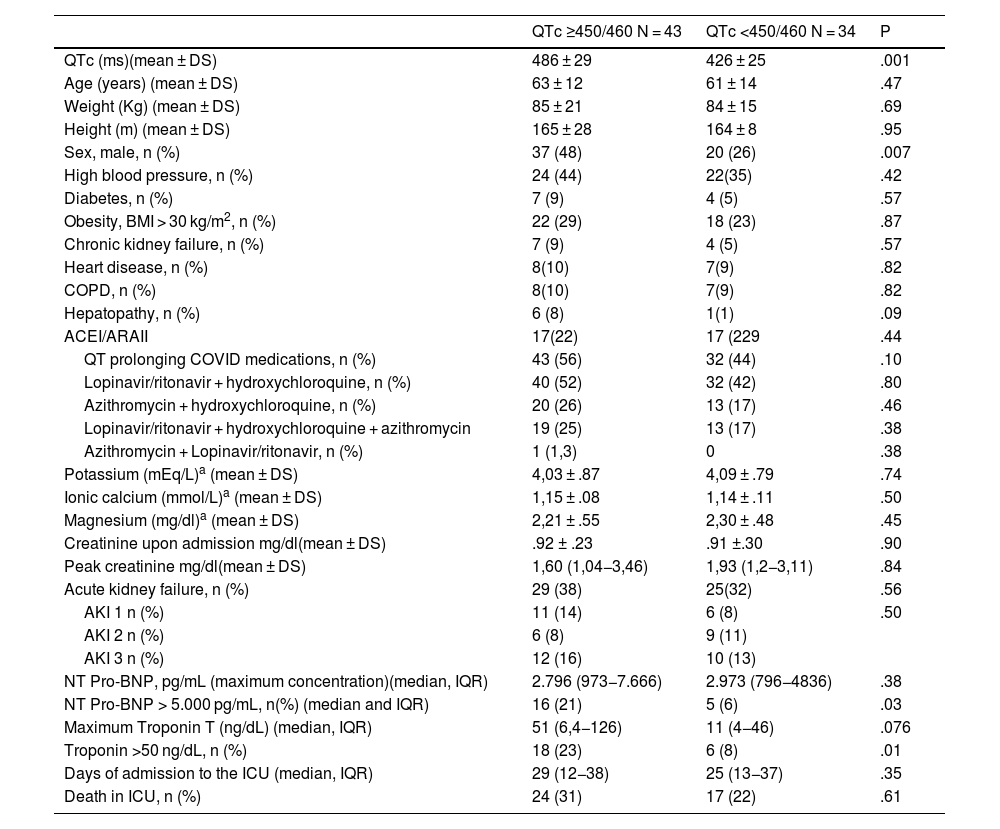Patients with SARS-CoV-2 infection may present cardiovascular involvement including myocarditis, arrhythmias and QT interval prolongation. Our objective was to evaluate the impact of COVID-19 and its treatment on ventricular repolarization and development of arrhythmias in critically ill patients.
MethodsRetrospective cohort study of critically ill COVID-19 patients during a 3-month period in whom at least one ECG was available. Relevant clinical data and specific treatment administered for COVID-19 were recorded. Prolonged QTc was considered prolonged when it measured ≥ 460 ms in women and ≥450 ms in men. The incidence and type of arrhythmias during the same period were recorded.
ResultsA total of 77 patients with a mean age of 62 ± 13 years, 20 women and 57 men, were evaluated. Sixty percent of the patients were hypertensive, 52% had a BMI > 30, and 70% developed acute renal failure during admission. Some 56% of the patients presented QTc prolongation. Forty-four percent presented some type of arrhythmia during their stay in the ICU, 21% of which were atrial arrhythmias. Overall mortality was 53%, with no differences between patients with or without prolonged QTc.
ConclusionsIn our series, a high proportion of critical patients with COVID-19 presented prolonged QTc and arrhythmias. The factors involved have been related to the elevation of cardiac biomarkers, the myocardial involvement of the virus and concomitant medication received in the ICU.
Los pacientes con infección por SARS-CoV-2 pueden presentar afectación cardiovascular incluyendo miocarditis, arritmias y prolongación del intervalo QT. Nuestro objetivo fue evaluar el impacto del COVID-19 y su tratamiento en la repolarización ventricular y desarrollo de arritmias en pacientes críticos.
Material y métodosEstudio de cohortes retrospectivo de pacientes críticos con infección confirmada por SARS-CoV-2 durante un periodo de 3 meses. Se registraron datos clínicos relevantes y tratamiento específico administrado para el COVID-19. Se consideró QTc prolongado cuando medía ≥460 ms en mujeres y ≥450 ms en hombres. Se registró la incidencia y tipo de arritmias durante el mismo periodo.
ResultadosSe evaluaron 77 pacientes con una edad media de 62 ± 13 años, 20 mujeres y 57 hombres. Un 60% de los pacientes era hipertenso, un 52% presentaban un IMC > 30, y el 70% desarrollaron fracaso renal agudo durante el ingreso. Un 56% de los pacientes presentó prolongación del QTc. El 44% presentaron algún tipo de arritmia durante su estancia en la UCI, siendo en un 21% arritmias auriculares. La mortalidad global fue del 53%, sin diferencias entre los pacientes con o sin QTc prolongado.
ConclusionesEn nuestra serie, una elevada proporción de pacientes críticos con COVID-19 han presentado QTc prolongado y arritmias. Los factores implicados se han relacionado con la elevación de biomarcadores cardiacos, la propia afectación miocárdica del virus y a la medicación concomitante recibida en la UCI.











